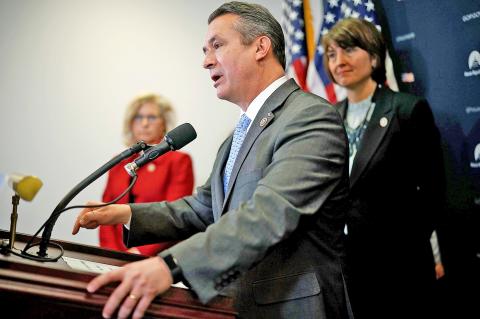Minister of Foreign Affairs Joseph Wu (吳釗燮) yesterday expressed gratitude to the US Congress for its staunch support of the nation by once again advancing legislation aimed at bolstering Taiwan, this time to establish a commission to boost its defense capability.
Wu made the comment in response to the Taiwan Defense Assessment Commission Act of 2018, which was introduced by Republican Representative Don Bacon earlier this month and proposes that a commission be established not later than 90 days after the enactment of the Act to conduct a comprehensive assessment of Taiwan’s defense establishment and provide recommendations to help boost Taiwan’s self-defense capability.
The bill indicates that the US reinforcing its commitment to Taiwan is consistent with the Taiwan Relations Act and the “six assurances,” as both governments work to improve Taiwan’s self-defense capability.

Photo: AFP
It also proposes that not later than one year after the commission is established, the Secretary of Defense must submit to Taiwan’s Minister of National Defense and the congressional defense committees a report on the commission’s recommendations.
The proposed bill shows the strong support that Taiwan has among US lawmakers, Wu said, adding that Taipei will work closely with Washington to ensure the deepening of defense cooperation between the countries and to guarantee regional peace and stability.
Wu made the remarks before giving a report to the legislature’s Foreign and National Defense Committee on the government’s strategy for responding to the diplomatic situation facing Taiwan after losing two diplomatic allies in a single month.
Burkina Faso broke off diplomatic ties with Taiwan on Thursday last week after the Dominican Republic did the same on April 30.
Separately yesterday, when asked for comment, Lin Wen-cheng (林文程), professor of China and Asia Pacific region studies at National Sun Yat-sen University, said that Taiwan should look to strengthen security arrangements with the US and Japan.
As Beijing has proved unwilling to reciprocate the moderate policies of President Tsai Ing-wen (蔡英文) over the past two years, the Taiwanese government should not stay on the defensive in cross-strait issues, but should consider active countermeasures, he said.
The promulgation in the US of the Taiwan Travel Act and the National Defense Authorization Act for 2018, which authorizes ports-of-call visits between Taiwanese and US navies showed that the nation has an opportunity to be proactive, he said.
For instance, Taiwan could be making a strong show of support for the US in the trade war against China, he said.
“China has forced our hand and put the question of our survival as a sovereign nation before us; we are left with no alternatives,” he added.
Former foreign affairs minister Chen Chien-jen (程建人) said that Taiwan needs to have a multi-faceted diplomatic strategy that simultaneously strengthens internal consensus and relations with China, as well as with other countries.

A magnitude 7.0 earthquake struck off Yilan at 11:05pm yesterday, the Central Weather Administration (CWA) said. The epicenter was located at sea, about 32.3km east of Yilan County Hall, at a depth of 72.8km, CWA data showed There were no immediate reports of damage. The intensity of the quake, which gauges the actual effect of a seismic event, measured 4 in Yilan County area on Taiwan’s seven-tier intensity scale, the data showed. It measured 4 in other parts of eastern, northern and central Taiwan as well as Tainan, and 3 in Kaohsiung and Pingtung County, and 2 in Lienchiang and Penghu counties and 1

FOREIGN INTERFERENCE: Beijing would likely intensify public opinion warfare in next year’s local elections to prevent Lai from getting re-elected, the ‘Yomiuri Shimbun’ said Internal documents from a Chinese artificial intelligence (AI) company indicated that China has been using the technology to intervene in foreign elections, including propaganda targeting Taiwan’s local elections next year and presidential elections in 2028, a Japanese newspaper reported yesterday. The Institute of National Security of Vanderbilt University obtained nearly 400 pages of documents from GoLaxy, a company with ties to the Chinese government, and found evidence that it had apparently deployed sophisticated, AI-driven propaganda campaigns in Hong Kong and Taiwan to shape public opinion, the Yomiuri Shimbun reported. GoLaxy provides insights, situation analysis and public opinion-shaping technology by conducting network surveillance

Taiwan is gearing up to celebrate the New Year at events across the country, headlined by the annual countdown and Taipei 101 fireworks display at midnight. Many of the events are to be livesteamed online. See below for lineups and links: Taipei Taipei’s New Year’s Party 2026 is to begin at 7pm and run until 1am, with the theme “Sailing to the Future.” South Korean girl group KARA is headlining the concert at Taipei City Hall Plaza, with additional performances by Amber An (安心亞), Nick Chou (周湯豪), hip-hop trio Nine One One (玖壹壹), Bii (畢書盡), girl group Genblue (幻藍小熊) and more. The festivities are to

AFTERMATH: The Taipei City Government said it received 39 minor incident reports including gas leaks, water leaks and outages, and a damaged traffic signal A magnitude 7.0 earthquake struck off Taiwan’s northeastern coast late on Saturday, producing only two major aftershocks as of yesterday noon, the Central Weather Administration (CWA) said. The limited aftershocks contrast with last year’s major earthquake in Hualien County, as Saturday’s earthquake occurred at a greater depth in a subduction zone. Saturday’s earthquake struck at 11:05pm, with its hypocenter about 32.3km east of Yilan County Hall, at a depth of 72.8km. Shaking was felt in 17 administrative regions north of Tainan and in eastern Taiwan, reaching intensity level 4 on Taiwan’s seven-tier seismic scale, the CWA said. In Hualien, the